Making Sustainability a Priority
How 7 SVZ Startups are Reducing their Environmental Impact
July 23rd, 2020
By: Annemarie Cutruzzola
The SVZ is home to several businesses that place sustainability at the center of their business models. During Plastic-Free July, we wanted to highlight our startups that have found ways to reduce or repurpose waste– whether it be plastic, textile, or food. These startups recognized an environmental issue and are committed to implementing innovative solutions through their business practices–whether it be their packaging, the materials their products are made from, or their production methods. Let's take a closer look at the impact each of these ventures is making and what protecting the environment means to the founders.
Niku Farms
If you’ve ever opened a package and been shocked by the amount of unnecessary plastic packaging, you know that businesses are part of the plastic waste problem. In 2013 (external link) , industry produced 78 million metric tons of plastic packaging worldwide. Of that, 40% went to landfills and 32% became land and sea pollution. Plastic packaging is often the go-to for delivery services–the easiest and cheapest option, but Niku Farms is doing delivery differently.
Niku Farms delivers ethically raised meat from local farmers directly to your door. The meat arrives in an insulated box to stay frozen. Their biodegradable, compostable, and water-soluble Green Cell Foam liner packaging is an alternative to styrofoam, and won’t end up sitting in a landfill. They are one of the first meat delivery companies to ship with this liner. Made from non-GMO cornstarch, this liner requires 70% less energy for manufacturing and produces 80% less greenhouse gases than petroleum-based foams. Learn more about Niku Farm’s packaging. (external link)
“We realize the immense plastic waste that the delivery industry produces and want to be pioneers that spark change by focusing on the most sustainable packaging options that are available."
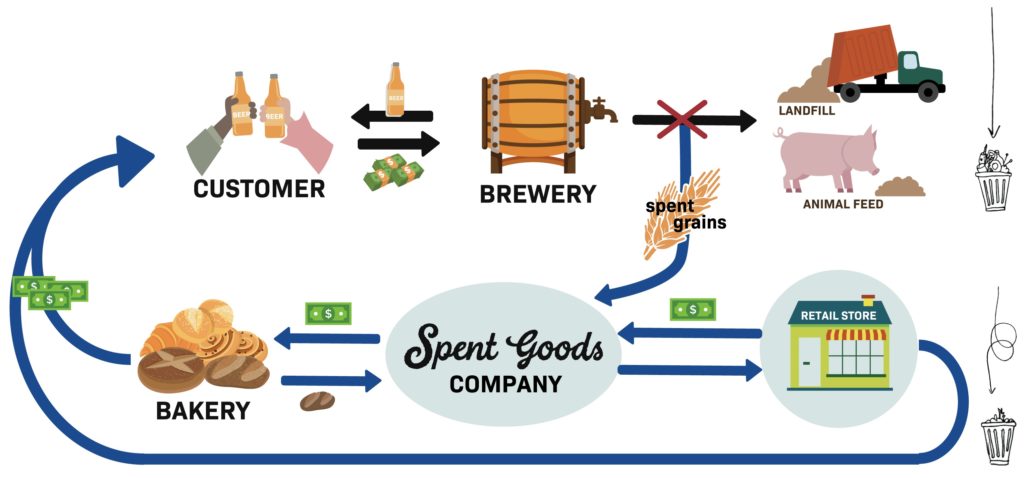
“We believe there is a better way to make a profit without sacrificing people and the planet."
Spent Goods
Every year in Ontario, 185 million KGs of brewery grains are disposed of. As they break down, greenhouse gases are released into the atmosphere. Spent Goods (external link) aims to find ways to transform food by-products into new food, and tackling brewery waste is their main project. Spent Goods has helped turn barley grain sourced from craft breweries into a variety of types of bread– from hamburger buns to pretzels. Through the sale of 17,000 loaves of bread, they’ve helped to offset 2.1 Tons of equivalent CO2. By finding practical ways to divert organic waste from landfills, Spent Goods is helping both businesses and consumers reduce their environmental impact.
The Good Tee
Fast fashion has negative environmental impacts at multiple stages of a garment’s life. Growing cotton requires large amounts of water and pesticides. When washing garments made from polyester, they shed microfibres that can’t biodegrade in our waterways, increasing the levels of plastic in the ocean. There’s also the textile waste that ends up in landfills. In Canada alone, the average person throws away 81 pounds of textiles every year. The “slow fashion” movement emphasizes buying fewer clothes and only buying items made sustainably and ethically.
The Good Tee embodies this movement by focusing on the quality of their clothes to increase their lifespan. From buttons and zippers to the tags on their clothes, they choose recycled, organic, and biodegradable materials. The organic cotton used to make their tees uses 71% less water and 62% less energy. They evaluate the sustainability of their garments by looking at the product’s life cycle and their role in reducing environmental impact at each stage. Learn more about The Good Tee’s sustainable fashion practices. (external link)
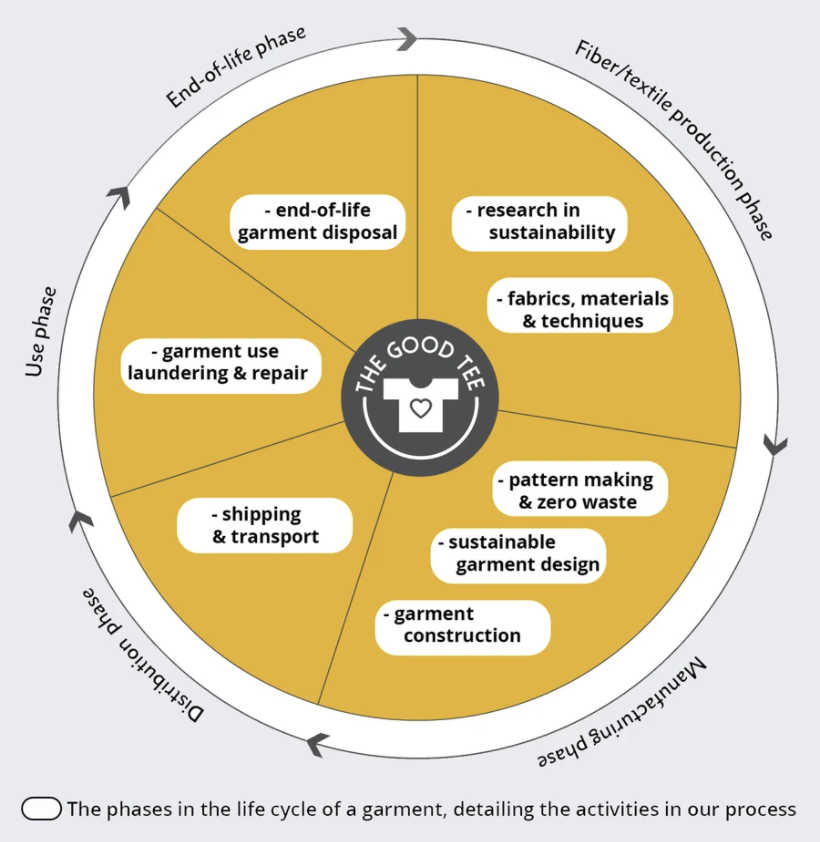
Source: The Good Tee
“As Dr Seuss Said. ‘Unless someone like you cares a whole awful lot, nothing is going to get better it’s not.’ The planet is suffering and we have only one home, and we cannot look away any longer.”
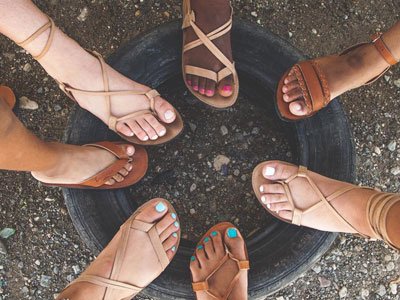
"Our choices affect the most vulnerable communities on earth and we have an opportunity to help turn that tide. The way forward through this is to think smaller in terms of our impact. Our choices are powerful and they make a difference.”
Brave Soles
When you picture plastic waste, tires probably aren’t the first things to come to mind. But just as polyester-based clothes shed microplastics when they’re washed, the synthetic rubber used in tires releases small particles of plastic when exposed to the friction created while driving on a road. Microplastics enter our oceans and do not degrade easily, and these particles account for anywhere between 15-30% (external link) of our plastic pollution problem. In many parts of the world, used tires are sent to landfills where they leach toxins, become breeding grounds for insects carrying diseases, and don’t break down for many years.
Brave Soles (external link) is tackling this problem by repurposing discarded tires to create handmade leather shoes and accessories. To date, they have upcycled 1,539 truck-sized tires from ditches, dumps and waterways. All of their products contain various elements of upcycled materials. Upcycling means that the materials aren’t altered from their original form, the soles are simply cut from tires and repurposed to make a new product. They continue this sustainable approach in their delivery methods, using upcycled fabric bags and biodegradable packaging. Read their full sustainability impact report (external link) .
Chic Made Consciously
Instead of using virgin resources to create new products, upcycling materials is one way that brands can reduce their environmental impact and contribute to a circular economy where products and materials are viewed as regenerative, not items to be used and discarded of.
Since 2015, Chic Made Consciously (external link) has helped communities in Cambodia and Bali divert their waste. Their accessory collections are handcrafted entirely from transforming tires, brass and textiles that otherwise would sit in a landfill. They have a line of accessories that are reclaimed from the inner tubes of tires, and their brass collection is 100% repurposed from the remaining 4-6 million war remnants still remaining on Cambodian land.
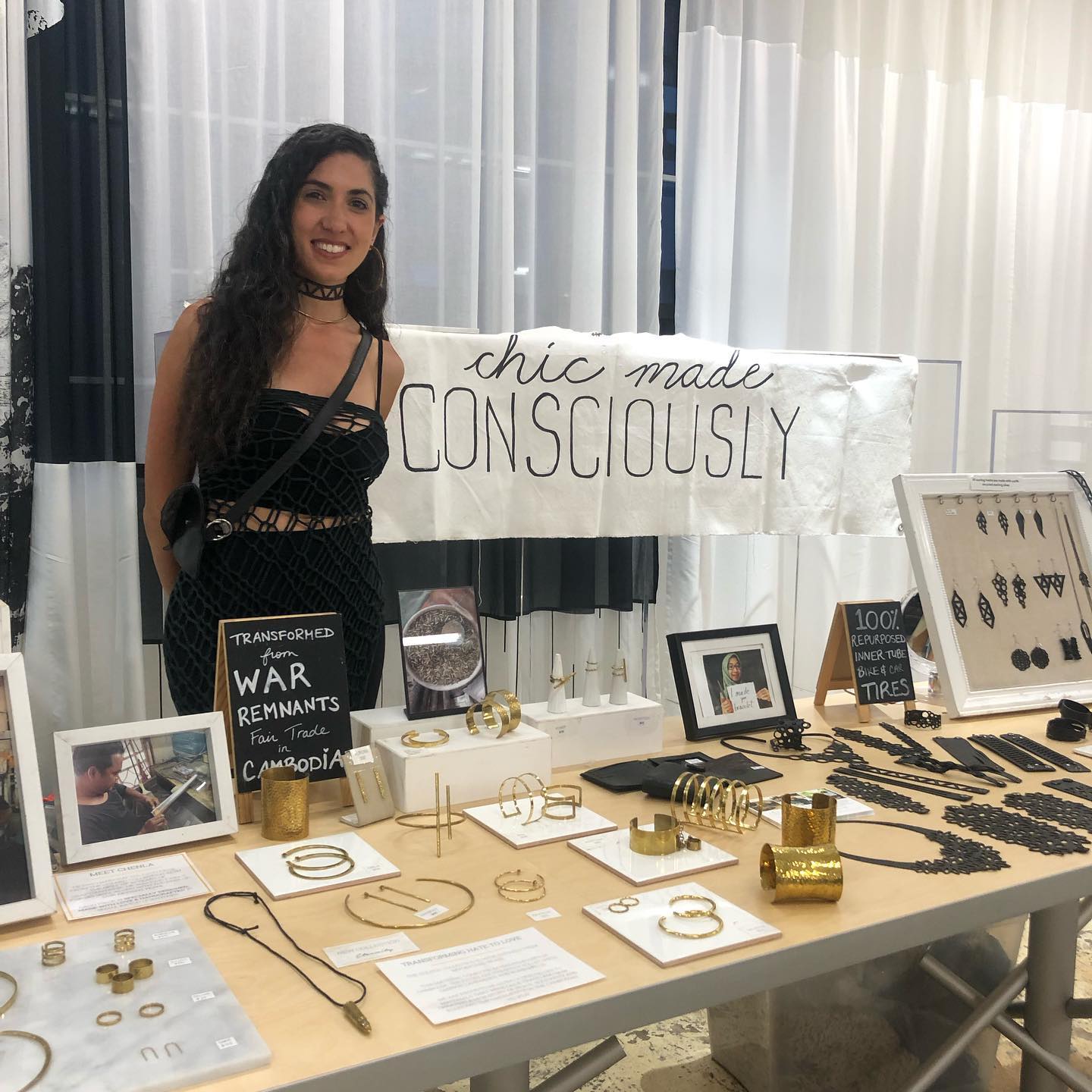
"Consumers hold tremendous power with how they consume and what brands they buy from and we hope to be a positive influence that can help instead of harm our earth.”
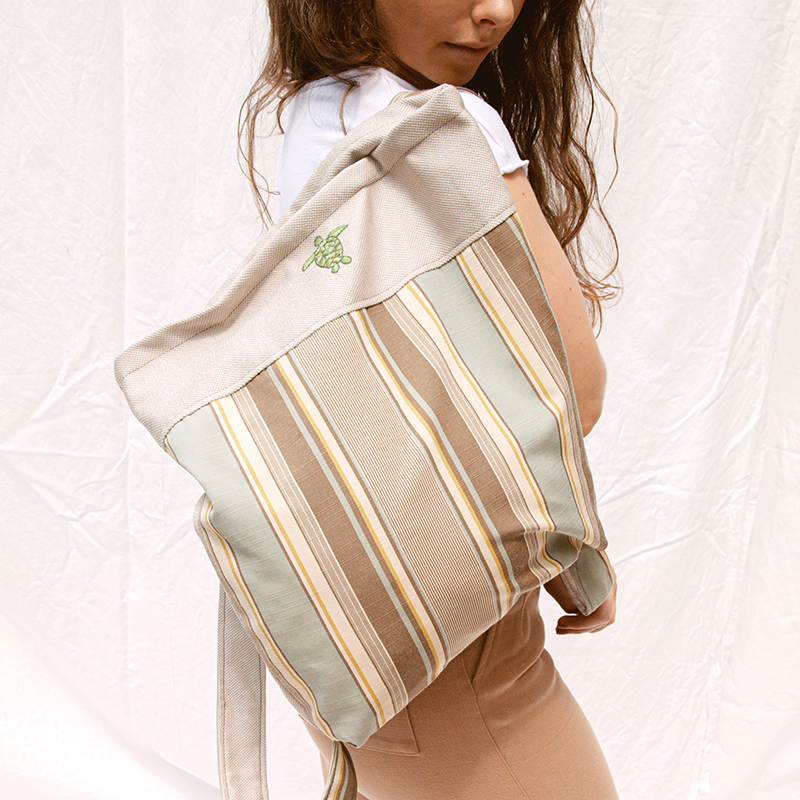
“Protecting the environment goes hand-in-hand with protecting our communities and ourselves. But it also goes hand-in-hand with social impact and creative design. We believe investing in sustainable design is the ultimate statement that you believe in the future."
Tight-Knit Syria
Startups with environmentally-friendly practices at the core of their business have the potential to make an impact, but it’s just as important for existing companies to realize the importance of sustainability and adapt their products to reduce environmental impact. Tight-Knit Syria (external link) is a non-profit organization working with Syrian refugee women to create handmade accessories.
While working side-by-side with their artisans, they have begun to start experimenting with sustainable production processes. Some of their eco-friendly prototypes include materials such as fruit leather, tires, and refurbished fabrics. Their collection of Samer bags (pictured left) is made with refurbished fabrics that have been redirected from landfills. We’re excited to see what Tight-Knit Syria does next as they continue to develop and finalize more products made sustainably.
Impact of these SVZ ventures to date:
Green Story
With eco-friendly initiatives becoming more and more prominent, these days it can be difficult to tell if a company is actually committed to sustainability, or if they just want you to think so. A recent EU study noted that only two out of 10 consumers trust green labels. Green Story aims to restore this trust by working with companies to analyze the environmental impact of their products. They have helped over 100 clients across 15 countries showcase their environmental and social impact by creating eye-catching visuals that are easy for consumers to understand.
In order to better understand the total impact of the SVZ sustainability-foucsed startups, we asked Green Story to create a visual that sums up the environmental efforts our startups have put forth (see above). We're proud of the success they've had in reducing textile waste, CO2 emissions, and more, and excited to keep supporting them as they innovate new solutions to environmental issues.